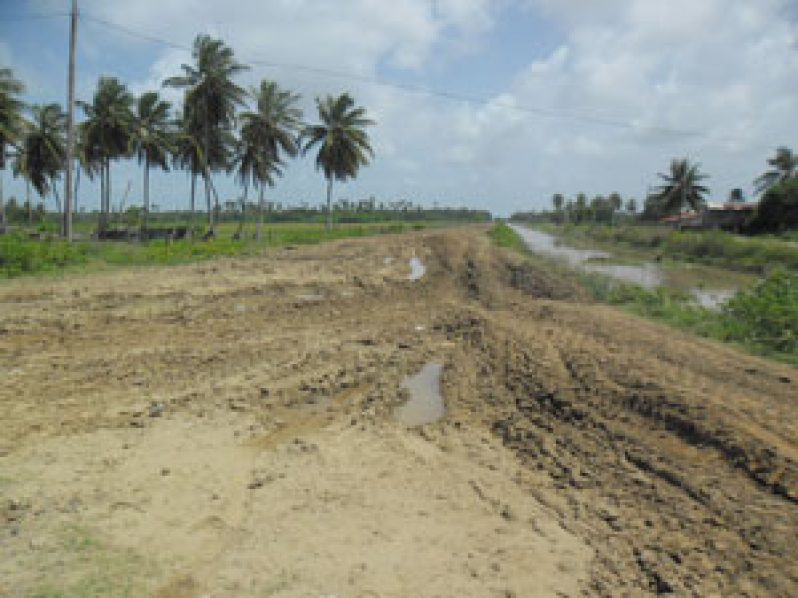LET me be honest about the pleasant and vibrant awakening I received when I recently visited the small village of Lichfield, on the West Coast of Berbice.
| ‘I does read de Chronicle every Sunday, and ah did wandering when y’all coming tuh Lichfield’ |

was expecting the customary hustle and bustle of village activity, noisy streets, squealing children, and raucous males ‘taking a tupps’ in the rum shops. I was in no way prepared for the intensely pleasant peace and tranquility that seemed to engulf me the moment I stepped out of the minibus and into the dusty but very tidy main road.
As the cool and refreshing wind blew in from the Atlantic Ocean, coconut palms almost seemed to move with a str
angely sweet, rhythmic grace that gave me a strange tingle. It was such a riveting picture of Mother Nature at work, and this dazzling spectacle seemed to be even mirrored in the flashing eyes and mischievous smiles of every villager I met and spoke with.
Giggling excitedly, one woman mouthed, “I does read de Chronicle every Sunday, and ah did wandering when y’all 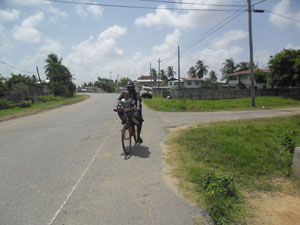 coming tuh Lichfield.” As she led me to a village elder, 75 year-old Alfred Dodson, she was gleefully shouting to friends and associates the reason for my visit, and the news spread like wild fire! So, at ‘every nook and cranny’ in the village, I was greeted with deep respect; and persons went out of their way to help in one way or another. The food vendors were falling over themselves to ensure I sampled their black and white pudding, and still steaming sugar cakes, and insisted that I devour a heaping plate of well made ‘country polouri’.
coming tuh Lichfield.” As she led me to a village elder, 75 year-old Alfred Dodson, she was gleefully shouting to friends and associates the reason for my visit, and the news spread like wild fire! So, at ‘every nook and cranny’ in the village, I was greeted with deep respect; and persons went out of their way to help in one way or another. The food vendors were falling over themselves to ensure I sampled their black and white pudding, and still steaming sugar cakes, and insisted that I devour a heaping plate of well made ‘country polouri’.
| ‘It was always a pleasure to draw water when the ladies of the village came out. They would gather around with dresses hugging their hips, with hands on their waists, feet tapping impatiently if someone was wasting the water or taking too long to fill their containers’ |
 There were no children running in the streets as obtains in other villages, save for a few who pranced about happily in the Lichfield Primary School compound, unmindful of the scorching midday sun. The few sitting by the roadside or enjoying some swank or other beverage on their front steps or verandas seemed so content with life that I truly envied their solace, and the natural comfort they seemed to be enjoying.
There were no children running in the streets as obtains in other villages, save for a few who pranced about happily in the Lichfield Primary School compound, unmindful of the scorching midday sun. The few sitting by the roadside or enjoying some swank or other beverage on their front steps or verandas seemed so content with life that I truly envied their solace, and the natural comfort they seemed to be enjoying.
And these people seemed to have everything positive going for them, as can be seen from the well dug and maintained irrigation canals, further heightened by the fact that almost every access street was paved and well covered with either stone and tar or asphalt.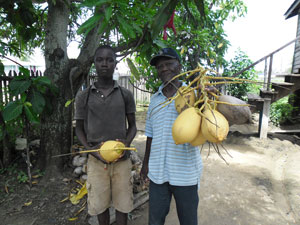
Beautiful and dazzling sunshine burst through the sky over Lichfield Village in most cases at 05:38 hrs, and would set with intriguing beauty and mystical allure at around 18:10 hrs. And, of course, this settlement can be associated with Latitude of 6.4833333° and Longitude of 57.649999999999999.
Located at some 73 miles from the city of Georgetown, Lichfield is nestled cosily between the less attractive villages of Cottage and Belle View. Lichield has a rich history, and was actually one of the portioned lands or settlements sold to Africans after slavery was abolished.
Historical refresher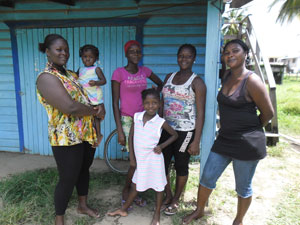 Immediately after Emancipation, the European planters and the Colonial Government took a decision not to sell land to the free Africans. The general aim was to ensure Africans continued to be a source of labour on the plantations. But economic circumstances forced the planters to soon change their position. Many cotton plantations, in particular, became unprofitable by 1838, because Britain began to purchase cheaper cotton from the United States, where there were very large cotton plantations which used African slave labour.
Immediately after Emancipation, the European planters and the Colonial Government took a decision not to sell land to the free Africans. The general aim was to ensure Africans continued to be a source of labour on the plantations. But economic circumstances forced the planters to soon change their position. Many cotton plantations, in particular, became unprofitable by 1838, because Britain began to purchase cheaper cotton from the United States, where there were very large cotton plantations which used African slave labour.
The smaller cotton plantations in Guyana could not survive in such a situation, and some of them were abandoned. The owner of Plantation Northbrook, a cotton plantation on the East Coast Demerara, decided to sell it to a group of 83 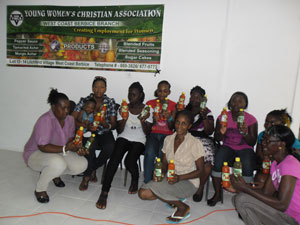 Africans for 30,000 guilders, equivalent to 2000 British pounds or $10,000. Those Africans, like many others, had saved money that they had earned over time from work done during the years of apprenticeship, between abolition of slavery in 1834 and the time when indentureship began in 1838. They were mainly headmen and mechanics from Grove, Paradise, Hope and Enmore; and since much of the money they had saved was in the form of coins, they had to transport the payment in wheel barrows to the seller.
Africans for 30,000 guilders, equivalent to 2000 British pounds or $10,000. Those Africans, like many others, had saved money that they had earned over time from work done during the years of apprenticeship, between abolition of slavery in 1834 and the time when indentureship began in 1838. They were mainly headmen and mechanics from Grove, Paradise, Hope and Enmore; and since much of the money they had saved was in the form of coins, they had to transport the payment in wheel barrows to the seller.
Shortly after, Queen Victoria agreed to a request from the new owners to rename the plantation Victoria, in her honour.
By 1839, Africans had purchased Plantations Lichfield, Golden Grove, St. John and Providence in West Berbice. Lichfield was bought by one person, Cudjoe Mc Pherson, for $3000; and he later divided the plantation into 12 sections, which he sold to other Africans for a profit.
By this time, the planters had realised that many Africans had accumulated much savings, so they immediately raised 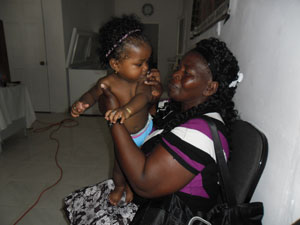 land prices. When 61 Africans bought Beterverwagting, a plantation smaller than Northbrook, they had to pay $22,000 for it. New Orange Nassau, a plantation of 800 acres, was purchased by 128 persons for $50,000 in 1840, and it was renamed Buxton in honour of Thomas Buxton, who had championed the cause of Emancipation in the British Parliament. In 1841, another group paid $80,000 for Plantation Friendship, located next to Buxton.
land prices. When 61 Africans bought Beterverwagting, a plantation smaller than Northbrook, they had to pay $22,000 for it. New Orange Nassau, a plantation of 800 acres, was purchased by 128 persons for $50,000 in 1840, and it was renamed Buxton in honour of Thomas Buxton, who had championed the cause of Emancipation in the British Parliament. In 1841, another group paid $80,000 for Plantation Friendship, located next to Buxton.
Some planters used other methods to make quick money by selling portions of their estates to African labourers. On the Essequibo Coast, for instance, the owners of Dageraad, Mocha and Westfield divided the front lands into lots and sold them for between $100 and $200 each. Soon, a thriving “proprietary” village of Africans developed in that area, and was named Queenstown in honour of Queen Victoria. In the same manner, the front lands of Plantation Aberdeen were divided and sold to Africans, who established the village of Williamstown. In a very short time, other “proprietary” villages were established throughout the coast of the then British Guiana.
In 1840, the white sugar plantation owners decided to reduce the wages for African field and factory labourers. They claimed that they had to do so because the export price per ton of sugar had dropped below the cost of production. The owners also discontinued the allowances of food and medicine to the workers, most of whom had continued to live on the plantations. To deprive the workers of other forms of subsistence, and to force them to accept the lower wages, they also prevented them from fishing in the canals, and destroyed their pigs and chopped down the fruit trees growing on their small cultivated plots. If the African labourers did not comply meekly with this new situation, they were expelled from estates.
In response to these developments, the African workers on the Demerara and Essequibo estates went on strike from January to March. This strike greatly affected sugar production, since the indentured Indian, Portuguese and other 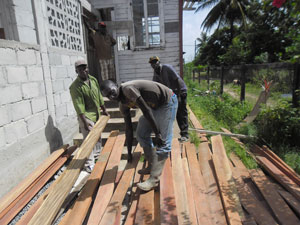 imported African labourers were still insufficient to handle all the work.
imported African labourers were still insufficient to handle all the work.
The Africans were of the view that they had no economic future if they continued to reside on the sugar plantations. They were seeing other Africans buying up the abandoned cotton plantations, and they felt that they also had to acquire their own land. During the period of the strike, 65 of them pooled their savings and purchased Plaisance for $39,000. The estates of Peter’s Hall, Farm and Garden of Eden on the East Bank Demerara, and Danielstown and Bush Lot on the Essequibo Coast were also acquired in 1840 by groups of Africans.
Another strike in December 1847 to protest another cut in wages forced more Africans to abandon the sugar estates. Some of them moved to the existing villages, while others who had no savings squatted on Crown lands.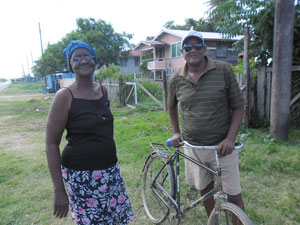
The moving away of Africans from the estates placed added pressure on sugar production, and the planters used devious means to force them to return to work there. One of these means was to let loose water from the estate canals to flood the nearby African villages. The planters, no doubt, felt that if the Africans’ farms were damaged, they would return to the estates to work.
The African villages also faced administrative problems during the 1840s. The shareholders, or proprietors, possessed no experience in cooperative management, and since they had used up their savings to purchase land, they had nothing left for maintaining the roads, bridges, sluice gates, and drainage canals. As a result, the conditions of the villages and the communal plantations deteriorated.
The land buying by Africans continued until 1852. There were, at this period, over 82,000 Africans of working age living in the then British Guiana, and roughly half of them lived in villages and worked from time to time on the estates. By that time, too, Africans had established 25 villages on lands they had purchased for over one million dollars. Africans also owned over 2000 freehold properties.
In the beginning
According to village elder Alfred Dodson, Lichfield Village was just a cluster of somewhat shabby houses in existence several years after the abolition of slavery. He said that, in many cases, the houses were far apart, so the present camaraderie and jovial interaction of residents was not present, because of the distance between houses.
Streets were not paved, and residents depended on the lone well in the village, a hangover from ‘the days of slavery’, for their constant water supply.
He reminisced on the days when there would be fiery disagreements at the well over whose turn it was to dip water, and in some cases there would be pulling of hair and scratching of faces to obtain the precious liquid.
“It was always a pleasure to draw water when the ladies of the village came out. They would gather around with dresses hugging their hips, with hands on their waists, feet tapping impatiently if someone was wasting the water or taking too long to fill their containers,” the old-timer said, adding:
“Many times, heated arguments broke out, and in some cases the ladies got locked in battle, much to the delight of onlookers. Often it was a good tussle and wallowing in the mud before they were separated by men folks, who would secretly enjoy the fights to a point before separating them.”
In those days, most families depended on agriculture, and many persons farmed in the back land, or maintained a kitchen garden at home. Some persons owned very large rice fields, and those would provide temporary employment for young villagers during the harvesting period.
The dams leading to the back lands were okay during sunshine, but became almost impassable during the rainy season.
Entertainment in those days would include beating drums around large bonfires, and engaging in dancing in wild abandon as villagers sought to maintain their African culture. Weddings and birthdays were eagerly anticipated, since this heralded great festivity and celebration. Most villagers loved the ‘Queh-Queh’ sessions before weddings, since they could gyrate and display their ‘forbidden sides’ as they consumed alcohol, metagee, cow face souse, black pudding and other delicacies.
Drainage was not as good as it is today, and some areas experienced flooding in days gone by.
The new village
Today, Lichfield is quite a quaint and impressive village, though it has managed to keep abreast of the changes of modernisation.
New, and in many case posh, houses have been built, and the village is now a startling combination of somewhat classic buildings and sprawling, majestic pastures that project a refreshing spectacle as cattle, goats and sheep graze contentedly, munching noisily on the juicy looking grass and shrubs.
The sight of men on horses chasing cows down the Lichfield Dam brought a vivid reminder that this was a location where poultry farming and cattle rearing brought in vibrant incomes for many residents.
The main road is in perfect shape, and the canals are well maintained. Residents rave that there is hardly any challenge in the village, save for the Lichfield Dam which becomes intolerable during inclement weather.
Lichfield residents enjoy continuous electricity, a constant supply of potable water, and they ensure their village is kept clean through self-help initiatives and burning of garbage and refuse.
Today, the women in this village are benefiting greatly from the implementation of the Young Women’s Christian Association’s (YWCA’s) programmes, which are actually an IDCE/Ministry of Agriculture initiative geared at providing opportunities in the areas of catering, tailoring, floral decoration practices, making of pepper sauce and kitchen seasonings, achar and other items.
This institution was formed in 2003, according to residents, to mould young Christian women, create employment for them, and to inculcate in them better values and morals. What began as a simple bottom house venture for group members became a more established venture through efforts of the European Union (EU) in 2005, and a stately concrete building was built to accommodate the members, which began to increase over time.
Today they market their products to entities all around Guyana, but are looking to extend their services to the entire Caribbean. They are assisted in their efforts by the REID’S Organisation, which is being financed by the Ministry of Agriculture, according to members.
This body is headed by a president, vice president, a committee and other executive members who have varying functions.
Lichfield also has a well-established library, and this is used widely by youths in the village for leisure time reading and for assignment research. There is also the St. Jude’s Anglican Church, at which many villagers worship.
Historical Lichfield
Moravian Church is a major landmark, since it has been standing for now over fifty years, and is still going. Its contribution to the religious needs of the village have prompted church elders and residents to have the formerly wooden structure converted to concrete, and work is still ongoing on the structure. This initiative is being spearheaded by the church pastor, in association with church elder ‘Cousin Sheila’, as she prefers to be called.
Minor challenges
There is a playfield in Lichfield, and villages try to make do with it, but they are appealing to donors to provide the youths with proper sporting facilities to ensure that they are positively entertained and occupied during their leisure time.
Villagers would love to have their own night club or an entertainment joint of some sort, since they have to visit the neighbouring Belle View Village to enjoy the thrills of night life at the ‘Renaissance Nightclub’.
The lone bus shed in Lichfield is very old and is in a decayed state. The walls are missing in some places, and residents are pleading for a concrete structure to shield them from the onslaughts of the weather.
The ‘Suga Ship Hangout Bar’ is closed today, so the young men will normally gang up at the small stalls that have popped up, or they would gather around the food stalls and drink their lives away, when the bar is not opened in the neighbouring village.
They say there is really no scope for employment in this village, but youths are contented to work in the back lands, or catch a ‘bigger dollar’ when the rice farmers harvest their paddy. That aside, many are okay with selling from the small grocery outlets they have erected around the village.
May youths have migrated and are working in foreign states, and are sending back large dividends for their relatives. This accounts for the many attractive buildings and a few businesses which are presently in the making.
With its smiling people and welcoming hospitality, its lush pastures and thriving animal life, Lichfield can be best described as the perfect ‘relaxation alcove’, most suited for the nature-minded and those who desire the more tranquil, quiet side of life.
Come visit this quaint little village and enjoy its pleasant surprises.




.png)


